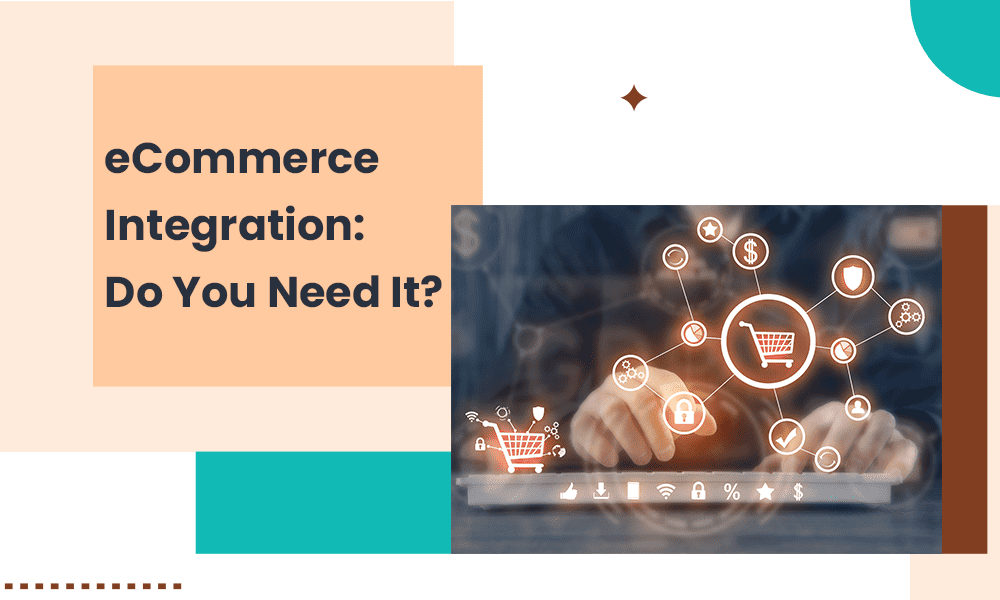An eCommerce platform is a great choice for your company no matter its size and industry, but what you need to concern yourself with as well is eCommerce integration.
If you need an introduction to the topic, this article is a great place to start.
We’ll explain what this form of integration is, including the various types, and then delve into the benefits of eCommerce integration.
Table of Contents
What Is eCommerce Integration?

Your eCommerce platform integrates with third-party software by syncing up with said software and allowing you to utilize its functionalities within the eCommerce platform.
For example, EngageBay is proud to announce a recent integration with Shopify, which is arguably the biggest eCommerce platform out there.
This new integration unlocks the power of both EngageBay and Shopify. You can take your current Shopify data and then feed it into EngageBay to unlock marketing campaign insights.
Further, you can use EngageBay’s Shopify integration to create your own online store. Sync up your existing contacts and begin selling to them, target marketing opportunities as they become timely, track order details, and review analytics such as customer behavior and lots more.
That’s one example of eCommerce integrations of many, and quite an excellent example, at that!
Convert Shopify data into campaign gems with EngageBay
The Types of eCommerce Integration Platforms
Let’s now go over the various types of integrations that can occur on your eCommerce platform of choice.
Add-Ons
The first type is add-ons, which are extensions, apps, and other off-the-shelf solutions that work for SaaS businesses, startups, small-to-mid-sized businesses, and all nature of companies in between.
The integration with an eCommerce platform occurs on a point-to-point level.
As a type of pre-made integration, an add-on is readily available to use, which makes it a convenient option.
Middleware
The next type of eCommerce integration is middleware.
The pre-built connectors in this hub include cloud services and computer software. You can use the connectors within middleware to sync up to endpoint systems. That explains why middleware is referred to by some as computer glue.
Middleware and other pre-made integrations are very scalable so that as your business grows, the eCommerce integrations you’re using can continue to grow right alongside you.
This will make your eCommerce platform even more valuable.

Custom-Built Integration
The last option is to customize everything. Based on the size and needs of your current eCommerce system, you’ll create an integration that connects with the services you need to grow.
These types of integrations take the longest to create and implement because they’re unique to every company that uses them.
Further, custom-built integrations are the most expensive due to their very nature.
However, if you’re looking for an integration solution that fits your eCommerce business like a glove, a custom solution is the way to go. That said, you will have to proactively scale the integration as your company grows and your needs change.
12 Ways You Can Use CRM for Ecommerce Personalization
What Are the Benefits of eCommerce Integration?
eCommerce integration can be highly advantageous for your company, so let’s look at the various ways how.
Better growth rates
Growth should never be something a company needs to fear because you’re stressed that your current eCommerce solutions won’t grow with you.
The scalability of eCommerce integration encourages your startup or small business to open its wings and fly. You can take your company to new heights with the support of the integrative platform.
Announcing the integration may lead to another business spike, especially if you can partner with a company or brand that your audience is excited about.
Better data integrity
Once you open the door to integrating with other companies, you now have double the data security and integrity. That will put your own company’s collective mind at ease as well as alleviate security concerns on the part of your customers.
Data integrity extends to data accuracy as well, which is something you’ll have to worry about far less thanks to the backing of another company within your eCommerce sphere.
Read also: 15 Easy Steps to Build a Personalized eCommerce Marketing Plan
Enhanced customer experience
Companies are always striving to improve the customer experience, and surely, your own startup or small business is no exception.
The customer experience is everything to do with how your eCommerce platform functions on the part of the customer.
By integrating with other services, you can expand functionality or simplify processes for purchasing and tracking orders.
Your audience will love how much easier it is to do business with you, and in the future, should certainly feel inspired to offer you their repeat business.
Saves time
Especially on the part of the customer, eCommerce integrations save time.
Imagine having an integration that makes it easier for a customer to check out or track their order from mobile, or even an integration that saves the customer time from having to use two separate platforms when they can use one through the integration.
These kinds of services make integrating with another service worth its weight in gold.
Read also: eCommerce CRM: The Top Platforms for Streamlining Your Business
Increased sales
It’s no secret that happy customers are usually happy to spend money as well.
Once customers see how your new integration works and get a feel for it themselves, then as we said before, they will likely be eager to make repeat purchases.
More so, they might refer your eCommerce store to their friends, family, or colleagues after enjoying such a smooth checkout process. Referrals are always great for business!
14 Stunning eCommerce Landing Page Examples (With Expert Tips)
Conclusion
eCommerce integration such as EngageBay’s new integration with Shopify benefits both parties involved in the integration, but it’s the customers who win the most.
They now get to enjoy an optimal checkout process while you can rely on the services of others to scale up in the future.
Integrating with Shopify is not all we’ve done. Our EngageBay team has now rolled out eCommerce marketing automation to save marketers like yourself more time.
You can retarget abandoned cart users, send welcome emails and transactional emails, split-test your email marketing campaigns, and more easily build your lists.
Try EngageBay today!
👉Boost your ecommerce success with the ultimate CRM strategies – dive into our in-depth guide today! 🚀
